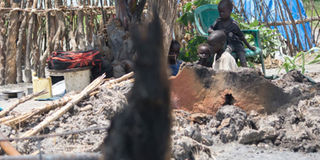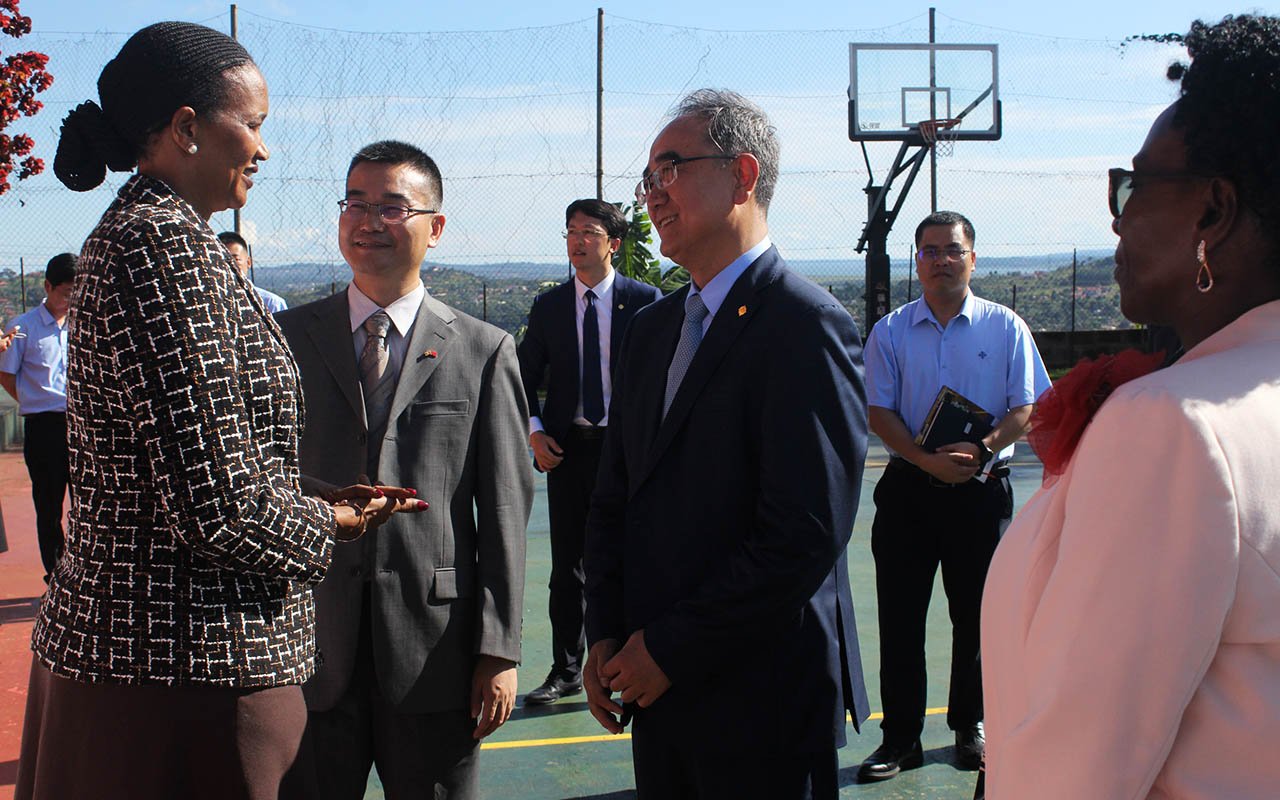Obama in Ethiopia, focus on South Sudan peace bid

Children play in a courtyard which was burnt down in June during fighting in a small locality in Mayendit County of Unity State South Sudan. PHOTO AFP
Kigali- Barack Obama will on Tuesday become the first US president to address the African Union, the 54-member continental bloc, at its gleaming, Chinese-built headquarters.
He will also hold talks with regional leaders on the civil war in South Sudan in an attempt to build African support for decisive action against the war-torn country’s leaders if they reject an ultimatum to end the carnage by mid-August.
The US leader officially began a two-day visit to Ethiopia yesterday, the first-ever trip by a US president to Africa’s second-most populous nation and the seat of the AU.
President Obama, who flew into a rainy Addis Ababa late on Sunday after a landmark trip to Kenya, his father’s birthplace, is to hold talks with the Ethiopian government, a key strategic ally but much criticised for its record on democracy and human rights.
Air Force One touched down at Addis Ababa’s international airport after a short flight north from the Kenyan capital Nairobi, and the president was greeted on the tarmac by Ethiopian Prime Minister Hailemariam Desalegn.
AU Commission chief Nkosazana Dlamini-Zuma has hailed what she said will be a “historic visit” and a “concrete step to broaden and deepen the relationship between the AU and the US”.
While Kenya launched one of the biggest security operations ever seen in the capital Nairobi to host Obama from Friday evening to Sunday, the habitual reach of Ethiopia’s powerful security forces meant there was little obvious extra fanfare ahead of his arrival.
Ethiopia, like Kenya, has been on the frontline of the fight against the Somali-led, Al-Qaeda-affiliated Al-Shabaab. Both nations have troops in Somalia as part of an AU and US-backed force and are key security partners to Washington.
But the visit also comes two months after elections that saw the prime minister’s ruling coalition take every one of the 546 seats in Ethoipia’s parliament.
The opposition, which lost its only seat, alleged the government used authoritarian tactics to guarantee victory.
The US State Department has noted Ethiopia’s “restrictions on freedom of expression,” as well as “politically motivated trials” and the “harassment and intimidation of opposition members and journalists”.
Ahead of the visit, the White House stressed it frequently addresses issues of democracy and political rights in the region. Having spoken frankly in Kenya on human rights and corruption, Obama is now expected to address Ethiopia’s — and Africa’s — democracy deficit.
But Ethiopia has come far from the global headlines generated by the 1984 famine, experiencing near-double-digit economic growth and huge infrastructure investment that have made it one of Africa’s top-performing economies and a magnet for foreign investment.
Through the tinted windows of his bomb-proof presidential limousine, nicknamed “The Beast,” Obama will see Addis Ababa’s construction boom of tower blocks, as well as sub-Saharan Africa’s first modern tramway.
High on the agenda Monday are talks with leaders from Ethiopia, Kenya and Uganda as well as Sudanese Foreign Minister Ibrahim Ghandour to try and build a collective front to end the 19-month civil war in South Sudan, the world’s youngest nation.
Signalling a deeper commitment to ending violence that has killed tens of thousands of people and forced more than two million from their homes, Obama is expected to make the case for tougher sanctions and a possible arms embargo.
US, China compete for influence in Africa
As US President Barack Obama visits East Africa this weekend there is an understandable focus on issues like security and counter-terrorism, as well as entrepreneurship.
But for many people on the continent, America’s role appears to be a distant, nebulous one, increasingly overshadowed by that of another emerging global super-power.
Here in Lesotho, the Chinese are in almost every village - from the cornfields of the western lowlands right up to the snow-dusted peaks of the mountainous east.
In Nazareth, halfway up a steep hillside an hour’s drive out of the capital Maseru, a cluster of people were gathered at the door of the local store. A young woman from southern China was helping a farmer to load supplies into a pickup truck.
“It’s good here. The air is much cleaner than back home,” she said, politely declining to give her name.
Inside, her Chinese colleague was manning the cash register with China’s CCTV News playing on a television nearby. The only American brand visible came in the form of a handful of Coca Cola bottles in a fridge.
“I’ve been here two years. My relatives were already here. Business is okay. I feel the Basotho people respect us, to a certain point, because we do help out and they think we’re okay as people,” said the shopkeeper.
Some locals grumble about the influx of Ba-China - the Chinese - saying they are taking away jobs, and undercutting local businesses.
But many quietly acknowledge the entrepreneurial spirit and resourcefulness of the mainland Chinese and Taiwanese business people whose presence is strikingly obvious in this small nation of some two million people.
“American investors don’t come to Africa.... I don’t think they know much about this region, and we need to try and show them what we are, what we do. The Chinese are everywhere. I think they are great explorers,” said Motebang Mokoaleli, from Lesotho’s National Development Corporation.
But if American business people are thin on the ground in Lesotho - and the only one we could find was running the local grain mill - it does not necessarily follow that American influence is small here.
The biggest employer in the country is the garment manufacturing industry, housed in warehouses on the edge of Maseru. Some 40,000 locals are currently working here, many for wages of little more than $3 a day.
None of the workers I spoke to had any idea that the tracksuits they were stitching together were all heading for the United States.
Agoa contribution
Their work is a direct result of America’s African Growth and Opportunities Act (Agoa), which offers tax breaks to support manufacturing in a select group of African countries and is single-handedly responsible for the garment industry’s success in Lesotho.
But, unsurprisingly, it is business people from the Far East, and in particular from Taiwan, who are taking advantage of Agoa to build and run the sector in Lesotho.
“We’re not the enemy. We want to get the benefit, but we also benefit our team, our employees. This past 10 to 15 years we see a big change here - people are able to have education,” she said, praising an American initiative that “makes countries develop - not just [through] aid”.
On the far side of town, perhaps 50 people had gathered at an HIV-Aids clinic for check-ups. Here, too, was another example of America’s hugely significant, but largely arms-length, support for Lesotho.
Through a range of programmes, not least the long-running Pepfar initiative, the US has poured huge sums into fighting the virus, which is currently thought to affect some 23 per cent of the population (the second highest in the world).
“The Americans have been very generous to Lesotho. I think without the US things would be dismal, to say the least.
“A lot of people would have died long ago because many people in this country cannot afford antiretroviral treatments for HIV,” said Dr Edith Mohapi, the head of Baylor College of Medicine Children’s Foundation Lesotho.
Some people, harking back to the colonial “scramble for Africa”, see China and the US locked in a new contest for resources. Perhaps it will come to that, but in Lesotho, as in many parts of the continent, the world’s two biggest economies seem to be playing different, and in some respects complementary, roles.
Africa Review




